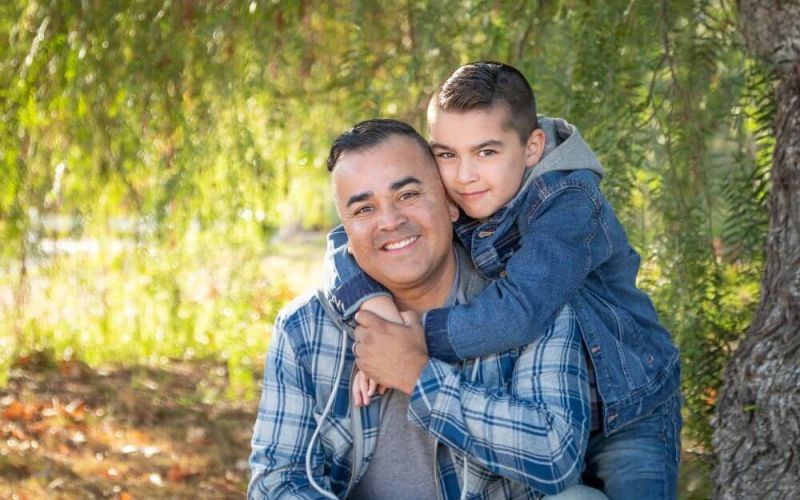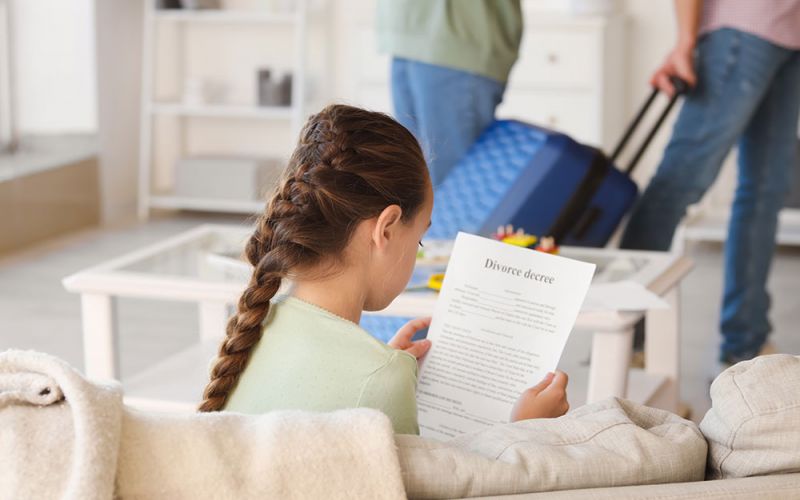"*" indicates required fields
Illinois Child Custody Questions
- Who will get custody of our child?
- What is joint custody? What is sole custody?
- If both parents share custody does anyone pay child support?
- Can a parent refuse to allow visitation if child support is not paid?
- When can my child decide which parent to live with?
- Do grandparents have custody and visitation rights?
- What is a parenting plan, and do I need one?
- If my separation agreement includes custody/support can it be included in the divorce decree?
- What can I expect from temporary orders?
- When will child custody be decided?
- When can I modify custody?
- What if we cannot agree on a custody arrangement?
- What is an ex parte order?
- How is custody decided?
- How can I increase my chances at getting a larger custody agreement?
- What is visitation?
- Can a judge order supervised visitation or no visitation?
- What should I know before a custody trial?
- Can I collect my own evidence to use if my custody case goes to court?
- Do I need to use a Guardian ad Litem/Custody Evaluator?
- Will my child need to appear in court?
- What is the Parental Kidnapping Prevention Act?
- What if my wife tries to move the kids out state?
- Can a parent change the child’s last name without the other parent’s permission?
- If I have custody, will I receive child support?
Illinois child custody attorneys provide answers to frequently asked questions with regards to Illinois child custody laws.
Who will get custody of our child?
The court determines custody according to the “best interest of the child” standard. In making this decision, the court should consider the following factors, no one of which is controlling and not all may have equal significance in a given case:
- The wishes of the parents;
- The wishes of the child, depending on the child’s age, maturity and education;
- The child’s interaction with the parents;
- The child’s adjustment to home, school and community;
- The mental and physical health of all parties;
- Any past and ongoing acts of violence by a parent against the other parent or a child;
- The willingness and ability of each parent to facilitate and encourage a close and continuing relationship between the other parent and the child.
What is joint custody? What is sole custody?
Joint custody may be awarded where the parents are able to cooperate effectively in matters directly affecting the child. Joint custody means that the parents share in making major decisions regarding the children, such as education, health care, and religious training.
When parents are awarded joint custody, they enter into a Joint Parenting Agreement, which specifies the residence of the child and each parent’s rights and responsibilities as to the child. The agreement also provides for a means of resolving disputes over parenting issues.
When one parent is not suitable to be responsible for the decisions affecting the child or the parents are unable to cooperate effectively in order to engage in joint custody, sole custody will be awarded to one parent by the court. Sole custody designates one of the parents as having the authority to decide the major issues in a child’s life.
Sole custody does not mean that the other parent is not allowed visitation with the child and joint custody does not mean equal parenting time. Physical parenting time is determined according to a visitation schedule agreed upon by the parties, or ordered by the court. A visitation schedule may provide for equal or near-equal parenting time, or it may provide that one parent has the child a greater amount of time than the other parent.
Additionally, both parents are entitled to medical, dental, child care, and school records, whether custody is sole or joint.
If both parents share custody does anyone pay child support?
Child support is determined upon the parents’ finances and the needs of the children, among other factors, including the parenting time, such that either parent may have a support obligation regardless of the custody arrangement.
Can a parent refuse to allow visitation if child support is not paid?
No. A parent cannot deny visitation if child support is not paid. Likewise, child support cannot be withheld if visitation is denied. If a parent denies visitation or withholds child support, he or she can be held in contempt of court.
When can my child decide which parent to live with?
Illinois law does not provide for allowing the children to decide with which parent they will live. The court may consider the child’s wishes, either through testimony of the parents or through an attorney or other professional on behalf the child. The judge may interview the children, but generally courts prefer to appoint a professional to speak for the children to avoid involving the children in the court proceedings.
Do grandparents have custody and visitation rights?
Illinois law provides that a grandparent, great-grandparent, or sibling of a minor child may petition the court for visitation rights when at least one of the following conditions exists:
- The child’s other parent is deceased or has been missing for at least 3 months. A parent is considered to be missing if the parent’s location has not been determined and the parent has been reported as missing to a law enforcement agency;
- A parent of the child is incompetent as a matter of law;
- A parent has been incarcerated in jail or prison during the 3 month period preceding the filing of the petition;
- The child’s mother and father are divorced or have been legally separated from each other or there is a dissolution proceeding pending involving a parent of the child or another court proceeding involving custody or visitation of the child (other than any adoption proceeding of an unrelated child) and at least one parent does not object to the grandparent, great-grandparent, or sibling having visitation with the child. The visitation of the grandparent, great-grandparent, or sibling must not diminish the visitation of the parent who is not related to the grandparent, great-grandparent, or sibling seeking visitation;
- The child is born out of wedlock, the parents are not living together, and the petitioner is a maternal grandparent, great-grandparent or sibling of the child;
- The child is born out of wedlock, the parents are not living together, the petitioner is a paternal grandparent, great-grandparent or sibling, and the paternity has been established by a court of competent jurisdiction.
In determining whether to grant visitation, the court may consider a number of factors, including whether the child resided in the home of the grandparent, great-grandparent, or sibling for at least 6 consecutive months, and whether the grandparent, great-grandparent, or sibling was the primary caregiver for the child for at least 6 consecutive months.
What is a parenting plan, and do I need one?
A parenting plan, or Joint Parenting Agreement, is required when the parties are awarded joint custody of the children. The Joint Parenting Agreement states that the parties shall jointly make decisions regarding matters of the child’s education, health care and religious training.
The agreement specifies each parent’s rights and responsibilities for the child and sets forth the visitation schedule agreed upon by the parties, or ordered by the court. The agreement also provides for a means of resolving disputes over the agreement.
If my separation agreement includes custody/support can it be included in the divorce decree?
If and when the parties officially file for divorce, the court will determine the custody and support issues, which may provide for the separation agreement’s terms to be incorporated into a divorce decree, or the parties or the court may change the terms as the best interests of the child require.
What can I expect from temporary orders?
After you file a divorce petition either party may request, or the parties may agree upon, temporary orders controlling issues pending the conclusion of the case, including issues of child custody, support and/or spousal maintenance. These orders remain in effect until the final divorce hearing. The temporary orders are replaced by the final and permanent order at the end of the case.
When making a decision as to temporary custody and visitation, the court should consider the same factors it would when considering permanent custody and visitation, and make the award based on what is in the best interest of the child.
When will child custody be decided?
After a divorce petition is filed, the court may enter a temporary order regarding temporary custody and visitation, which remains in effect until the court enters a final order in the case, either after the parties have reached an agreement, or after a hearing is held on the issue.
When can I modify custody?
Unless agreed upon by the parties, a motion to modify a custody judgment in Illinois may not be made earlier than 2 years after the date it was entered, unless the party seeking to modify custody can show that the child’s present environment may seriously endanger his/her physical, mental, moral, or emotional health.
What if we cannot agree on a custody arrangement?
If the parents cannot reach an agreement on custody, the court can require the parties to attend mediation. A mediator is a neutral third party, trained and appointed by the court, who helps the parents attempt to reach their own agreement regarding custody and visitation. If mediation is unsuccessful, the custody issues proceed to trial, and the mediation discussions remain confidential.
If the parents are unable to reach an agreement regarding custody and visitation prior to trial, the court may appoint a custody evaluator or guardian ad litem to assist the court in determining what is in the best interest of the children and a trial will be held on the issues, with the judge deciding what arrangement is in the best interest of the children.
What is an ex parte order?
An ex parte order is an order entered by the court when only one side is present. An ex parte order may be entered regarding child custody upon a party showing the court that an emergency warrants the entry of an order without notice to the other party, usually only for a short period until a full hearing with the other party present can be held.
An ex parte order may also be issued when one party fails to appear in court after having been given notice, which is also referred to as a default order.
How is custody decided?
The court determines custody according to the “best interest of the child” standard. In making this decision, the court should consider the following factors, no one of which is controlling and not all may have equal significance in a given case:
- The wishes of the parents;
- The wishes of the child, depending on the child’s age, maturity and education;
- The child’s interaction with the parents;
- The child’s adjustment to home, school and community;
- The mental and physical health of all parties;
- Any past and ongoing acts of violence by a parent against the other parent or a child;
- The willingness and ability of each parent to facilitate and encourage a close and continuing relationship between the other parent and the child.
How can I increase my chances at getting a larger custody agreement?
An experienced family attorney will be able to specifically advise you on things you can do to help obtain your desired outcome in a custody case. The following is a list of behaviors to avoid when involved in a custody dispute. Avoiding these and similar behaviors will help you stay focused on the custody issues instead of being dragged into side issues when you go to court.
- Do not interfere with or unnecessarily complicate the visitation of the other parent.
- Do not yell at the other parent or your children.
- Avoid physical confrontations with the other parent and/or children.
- Consult your attorney before deciding to move in with a significant other or making other changes in living arrangements that may affect your children.
- Do not unfairly or excessively criticize the other parent to friends, family members, or the Guardian ad litem/Custody Evaluator in your case.
- Do not withhold child support payments.
- Do not deny telephone contact with the other parent when the children are with you.
- Do not take the children out of the area overnight without letting the other parent know where the children will be and how to contact you.
- Do not remove the children from school or daycare for non-emergency reasons without discussion with the other parent.
In addition to avoiding these negative behaviors, you should also engage in positive behaviors with your children, and, to the extent possible, with the other parent regarding the children.
Spend as much time with your children as possible, be as involved and knowledgeable as possible with your children’s school and social activities, and document your involvement in your children’s daily lives. Attempt to keep the other parent informed of matters involving your children.
What is visitation?
Visitation, or parenting time, is the amount of time that each parent is entitled to spend with the children.
Can a judge order supervised visitation or no visitation?
A judge may order supervised visitation when unsupervised visitation would seriously endanger the mental or physical well being of the child. Denial of visitation may occur in extreme cases.
What should I know before a custody trial?
During trial, strive to present yourself in a positive light. Dress professionally, and conduct yourself appropriately. While witnesses are testifying or opposing counsel is presenting evidence to the judge, remain calm and keep your facial expressions neutral. Let your attorney object to witness testimony or the admission of evidence.
If you think of something important to tell your attorney, write a note. Do not let the judge see your frustration or anger. An experienced family law attorney will be able to answer your specific questions and ensure that you are prepared for trial.
Can I collect my own evidence to use if my custody case goes to court?
The evidence in your custody case will be obtained through the discovery process. This will include sending written requests to the other party, asking them asking them to answer specific questions pertaining to the case, or to provide specific documents or records.
If evidence is not obtained through this written discovery, it may be necessary to take the deposition of the other party or to subpoena records or other information. You should thoroughly discuss the issues of your case with your attorney to ensure that you obtain the necessary evidence to present your case.
Do I need to use a Guardian ad Litem/Custody Evaluator?
A Guardian ad Litem and/or Custody Evaluator may be involved if the parties cannot agree on custody. The decision to seek, or resist, the use of a Guardian ad Litem and/or Custody Evaluator is a litigation strategy issue which should be determined upon consultation with an experienced family law litigation attorney.
Will my child need to appear in court?
Most jurisdictions make strong efforts to avoid testimony by children in court. If testimony of a child is necessary, the child may testify in the Judge’s chambers, rather than in open court.
What is the Parental Kidnapping Prevention Act?
The Parental Kidnapping Prevention Act (PKPA) is a federal law that requires state courts to enforce custody and visitation orders entered by another state, and that prevents states from modifying custody and visitation orders entered by another state, unless the original state either no longer has jurisdiction or has declined to exercise jurisdiction.
The Uniform Child Custody Jurisdiction Act and Uniform Child Custody Jurisdiction and Enforcement Act are laws adopted by most states to also control litigation of custody issues as parents move throughout the United States. In addition, international custody disputes may be governed by the federal International Child Abduction Remedies Act and the Hague Convention on the Civil Aspects of International Child Abduction.
What if my wife tries to move the kids out state?
Once the initial custody case is commenced, the parties may be prevented from moving the children out of Illinois either by law or court order. If a parent is concerned about the other parent moving the children, a specific court order preventing any such move should be sought.
After an initial custody order is entered in Illinois, a parent seeking to move the children to another state must obtain court approval for the removal of the children from Illinois. The parent seeking to move the children must show that the move is in the children’s best interest.
In determining whether the removal of a child from the state would be in the child’s best interests, the court should consider the following factors:
- Whether the proposed move will enhance the quality of life for the child;
- Whether the proposed move is a ruse designed to frustrate or defeat the other parent’s visitation;
- The motives of the parent who is resisting removal;
- The visitation rights of the parents; and
- Whether a reasonable visitation schedule can be achieved if the move is allowed.
Can a parent change the child’s last name without the other parent’s permission?
While the permission of both parents is not required for a name change, the parent seeking the name change would have to file a petition with the court for the name change, which the other parent can challenge.
In order to get the name changed, the court has to find that the change is necessary to serve the best interest of the child. To determine this, the court will consider a number of factors, including the purpose of the name change, the wishes of the child’s parents, the wishes of the child, the relationship of the child with his or her parents, step-parents, siblings and step-siblings, and the child’s adjustment to his or her home, school, and community.
If I have custody, will I receive child support?
Child support is determined upon the parents’ finances and the needs of the children, among other factors, including the parenting time, such that either parent may have a support obligation regardless of the custody arrangement.

Written by Joseph E. Cordell

Joseph E. Cordell is the Principal Partner at Cordell and Cordell, P.C., which he founded in 1990 with his wife, Yvonne. Over the past 25 years, the firm has grown to include more than 100 offices in 30 states, as well as internationally in the United Kingdom. Mr. Cordell is licensed to practice in the states of Illinois and Missouri and received his LL.M. from Washington University in St. Louis, Missouri. Joseph E. Cordell was named one of the Top 10 Best Family Law Attorneys for Client Satisfaction in Missouri.
- Who will get custody of our child?
- What is joint custody? What is sole custody?
- If both parents share custody does anyone pay child support?
- Can a parent refuse to allow visitation if child support is not paid?
- When can my child decide which parent to live with?
- Do grandparents have custody and visitation rights?
- What is a parenting plan, and do I need one?
- If my separation agreement includes custody/support can it be included in the divorce decree?
- What can I expect from temporary orders?
- When will child custody be decided?
- When can I modify custody?
- What if we cannot agree on a custody arrangement?
- What is an ex parte order?
- How is custody decided?
- How can I increase my chances at getting a larger custody agreement?
- What is visitation?
- Can a judge order supervised visitation or no visitation?
- What should I know before a custody trial?
- Can I collect my own evidence to use if my custody case goes to court?
- Do I need to use a Guardian ad Litem/Custody Evaluator?
- Will my child need to appear in court?
- What is the Parental Kidnapping Prevention Act?
- What if my wife tries to move the kids out state?
- Can a parent change the child’s last name without the other parent’s permission?
- If I have custody, will I receive child support?

Illinois Resource Articles








